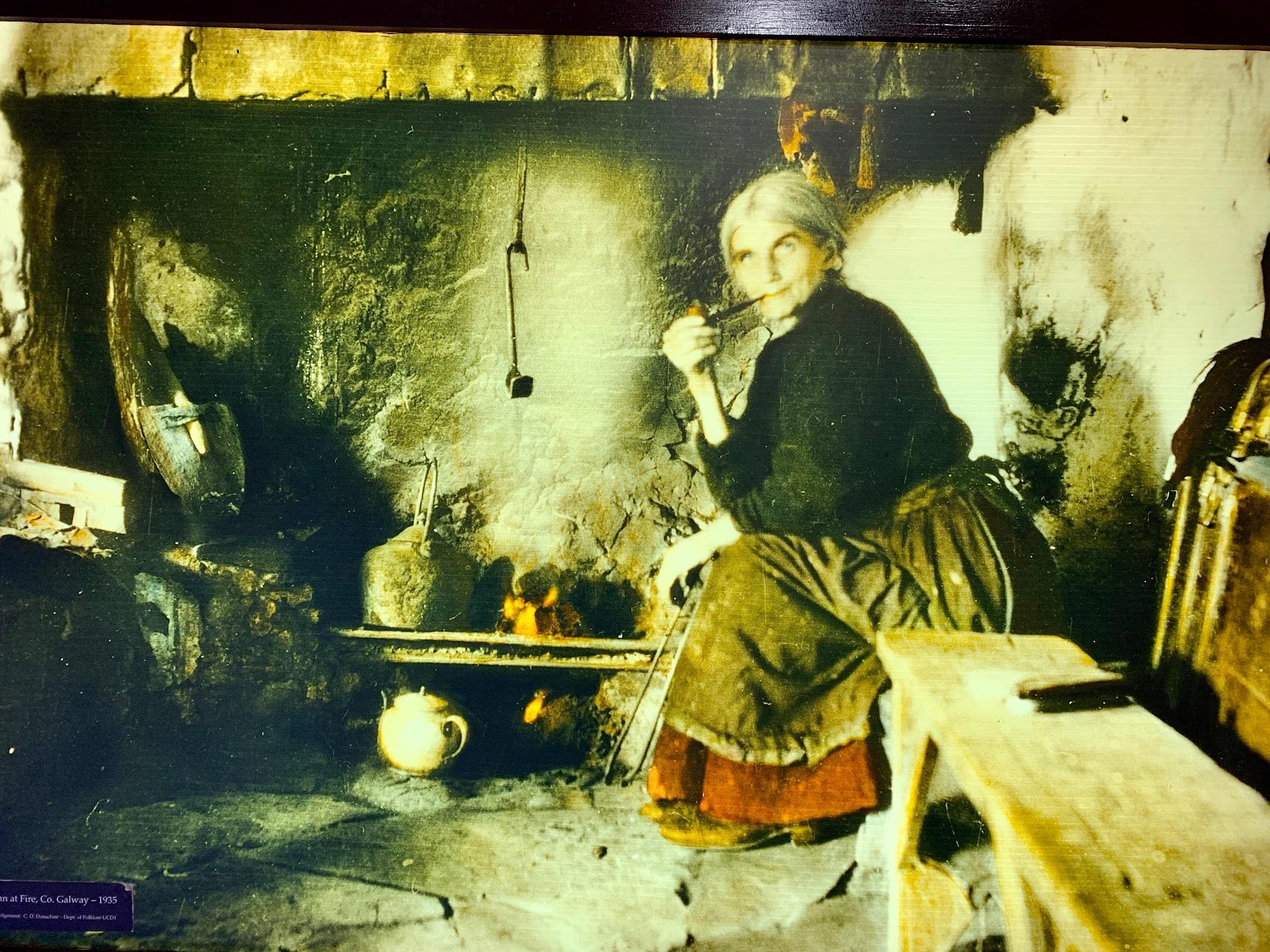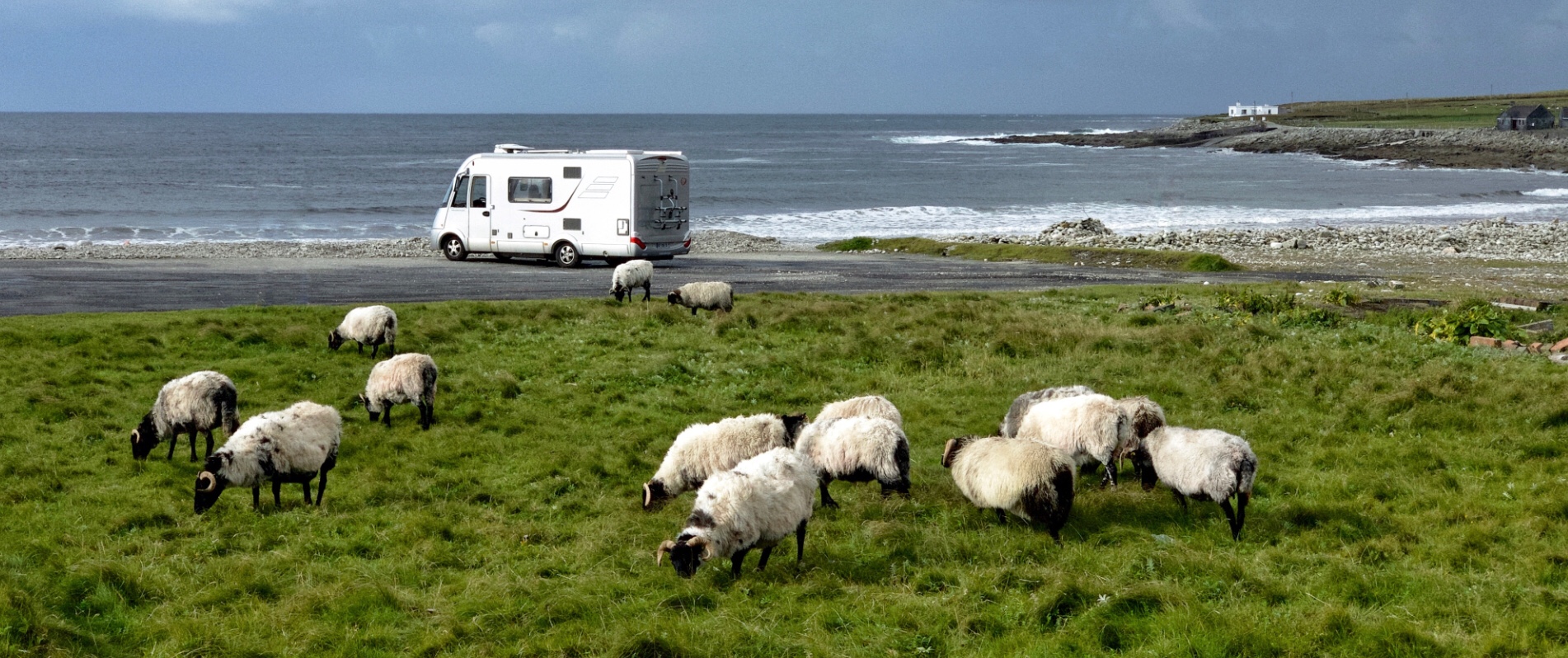Slieve League cliff sheep. You know what that means, right? I’ve gotten used to it but our boots are suffering.
Slieve League Sea Cliffs overlooking the Atlantic Ocean.
Lobster rolls on offer after our hike! Better than any of the ones we had in Maine.
Exhausted from our hike, we made our way to a quiet little marina on Lough Melvin, one of my most favorite overnight stops, which means it comes in at number 18 on my Top Ten Favorites List. Of course we had to travel about eight kilometers on an ‘L’ road to reach it, but this little marina was so perfect, we had to stay two nights. We had bought a few food items at the Donegal Food Festival, and did a fairly big shop a couple of days prior, and honestly, all I wanted to do was nest and cook. I just wanted to be in my home. Of course, it was pouring rain nearly the entire time we were there, so it was easy to just focus on anything but the outdoors. It was here that we fired up Bijou’s oven for the very first time and cooked a leg of lamb. Granted, it was a tiny leg, but it was soooooo delicious. Now we are in love with our oven! It’s so much more functional than we thought it would be!

Tiny marina on Lough Melvin. Still close enough to Northern Ireland that our phones would try to connect to towers there.
Just part of a leg of lamb.
The Irish rain fell the entire time we were there, somewhere between a drizzle and a soaking rain. It reminded me of the rain in Seattle, which I always loved when I was at home, cozy, cooking something, or just relaxing with a glass of wine. It was familiar and perfect.
When we hit the road we had planned a big day with three sightseeing stops. This time we were heading to Mullaghmore, a lovely seashore town and the location of the beautiful Classiebawn Castle. This was the summer home of Lord Mountbatten, who was, among other things, a mentor to Prince Charles, and who was killed in an explosion on his boat by the IRA. The castle is now privately owned and we weren’t allowed to go in, but the next best thing was a distant view, which we, and a few tour buses full of folks made do with. It’s funny, because I’d say we had 80 percent of the WAW to ourselves. But get close to some kind of drama, and here come the tour buses.
We try not to park this way if it blocks the sidewalks (that’s illegal, actually) but this one was nice and wide.
Classiebawn Castle.
Oh, hello bus tours. Are we in your way?
Our second stop of the day was at the grave of W.B. Yates, the famous Irish poet. Found in the churchyard, his grave is marked with a simple headstone with the inscription, “cast a cold eye on life, on death, horseman, pass by.” This was Yeats’ self penned epitaph together with the instructions that the grave consist of “no marble, no conventional phrase”. There is, of course, a gift shop at the church, and we had to go in and buy something. We adopted another little blackfaced sheepie, and named her Ceili. That’s Kayleigh, to you. Now we have two sheep in our flock. LOL, when Zoë was little, and we were reticent to get a pet because of the care involved, she asked, “Is there a pet that doesn’t poopie?” Yes, Zoë, yes there is and their names are Kevin and Ceili. They don’t shed, either.
Of course we adopted a lazy one.
At our next stop, the Carrowmore Megalithic Cemetery, we had a guide who was educated and passionate. We learned a lot about the history of Ireland, including the fact that the very first people to set food on the island following the retreat of glaciers were dark-skinned and blue-eyed, a combo that as a people, no longer exists. We learned a lot about Irish mythology and honestly, they give the Greeks a run for their money.
Learning about the monoliths.
After our stops, we made our way to the Lough Arrow Caravan Touring Park, a lovely place recently purchased by two Brits looking to ditch the corporate world and slow down. We had a nice stay there for two days, catching up on laundry and cleaning. Why does it seem like we have so much of that? I suppose it’s because we carry fewer things with us, and without laundry facilities of our own, we take advantage of the machines when we can. This place was out in the boonies, so other than Steven walking in the rain to a nearby church ruin, we didn’t do anything in the way of sightseeing.
This was a day of rainbows. We saw at least three! Steven went to explore this old church from the 16th century.
It always feels good to get chores done, especially when we’re headed to a place where we know we’ll be out and about seeing things. For our next stop, we headed to Achill Island, Co. Mayo. Though it may look like it would sound like a sneeze, it’s pronounced “Ackle”. Achill is the largest of the Irish islands at about 57 square miles. Like much of Ireland it has a history of comings and goings, settlements and immigration. In my humble estimates there are more sheep than people, by far. And, this is fact, the island is 87 percent peat bog.
Island traffic and sheepies scratching their itch on the sign.
On the way to the deserted village of Slievemore on Achill Island.
A “Booley House” where people would live in the summer months and let their cattle graze the hills.
Not a bad view for breakfast, eh?
Have I mentioned my obsession with the peat bogs of Ireland? Have you ever sat in front of a peat, or turf, fire? Man, they burn hot! They have a smell you either love or hate, or get used to, it’s kind of sickly sweet. As we would drive into a little village, it’s the first thing we’d smell. Even if it wasn’t all that cold outside, there will still be homes with the fires burning, to keep the damp at bay. The first time I sat in front of a peat fire was in 1999 at a cottage on Inishmore in the Aran Islands just south of Achill Island. It was in March and still chilly out, and I remember the heat coming off that thing, it was so cozy and fab! My sister-in-law, Jackie, loves a good turf fire, and says the Irish are “mad for the heat”. I can understand why, we haven’t exactly had a warm summer, but we’ve sure not suffered any more heatwaves! I’ll take a little chill over a heatwave any time.
Harvesting peat from the bog. It’s considered about as environmentally friendly as coal. 😬
 This would be me back in the day, a peat fire and my pipe!
This would be me back in the day, a peat fire and my pipe!
From Achill Island we made a beeline south to the Salthill area of Galway. We had tickets to the theater to see “The Miami Showband Story”. Our friend Aileen Mythen (wife of Steven’s bestie Kieran) was among the ensemble cast. Not only did we want to see her performance, but it was the only time we were able to see Aileen as she was performing in Belfast before they took the show on the road across Ireland. Back in the 70s, the Miami Showband were popular across Ireland. Sadly, one night as they crossed the border from the Republic into Northern Ireland, as they had done many times before, members of a paramilitary group opened fire and all but two of the the band’s members were essentially massacred. The incident sent a shock wave across the country, and there are still questions today as to why this happened.
Galway city and uileann pipe musician. “Uileann” is Irish for “elbow” which is used to pump air instead of blowing like bagpipes..
We met up with Kieran for a few drinks and dinner before the show, and made our way to the theater. The timeline of the show was a bit hard for us to follow, but the audience was filled with fans of the Miami Showband and they knew the entire history. It was wonderful to see Aileen in her professional environment, she is a very talented gal!
With Kieran and Aileen in Galway.
In order to make it to Galway in time for the show, we skipped over the Connemara National Park, a place we both really wanted to visit. So rather than continue south, we headed north again and made our way through the park. We went to the visitors center which had a whole section on peat bogs and how it was so important to the way of life in Ireland. We looked at the hikes available in the park and chose Diamond Hill to do the next day. For a wonderful overnight location, we made our way to Killary Harbor. We had the place to ourselves. We started our hike early the next morning and I was reminded that while I might enjoy a long-distance hike or two, I am not, even in the slightest, interested in scrambling up a mountain. More on that next time.
Kylemore Abbey, a Benedictine monastery founded in 1920. The castle part hosts modern events, including weddings.
Sunset on Killary Harbour.
An aerial view of our spot in Killary Harbour.
UP NEXT: WAW, Part III


Love the cliff sheep. You definitely packed in a lot in this post. The tour buses are always scary, no matter which country you are in.
Aren't those sheep just the cutest ever? We packed a lot into our weeks on the WAW and fortunately, those tour buses were rare. As you already know, shoulder season is the best! 🙂
I enjoyed spending part of my Camino experience with you. Buen Camino. Van
I'm overwhelmed with Wows! The cliffs and all the sheep and the ruins and that wonderful harbor. What an amazing route. Love your summary of the various roads – and the tour buses! Seriously, do they even know there are other people using the road? I'm so loving your travels, falling in love with Ireland through your words and pics.
Thank you, Jodee. There were so many wows, it's hard to describe them all. I'm so glad you are getting a taste of the driving, just in case you decide to make the trip yourself. 🙂
Van! So good to hear from you! We enjoyed meeting you and walking with you as well. I hope you had a great walk into Fisterra, we kept an eye out for you and Helga, but missed you! Stay in touch!